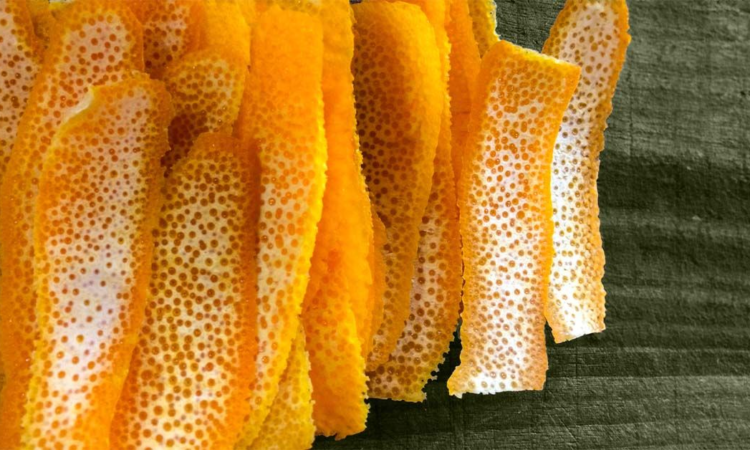
Over the last few years with much research focusing on the interactions between the body’s gut microbiome and overall health, the adage “you are what you eat” certainly rings true.
In regards to heart health, previous research links a healthy gut microbiome to
Past studies also correlate consuming certain foods, including blueberries,
Now, a new study recently published in the Journal of Agricultural and Food Chemistry has found an extract made from orange peels may help improve cardiovascular health.
For this study, researchers focused on an organic compound called
“We know from previous research that some gut bacteria feed on certain nutrients during digestion and that they produce chemicals — TMAO — that can help predict future cardiovascular disease,” Yu Wang, PhD, associate professor – food science at the UF/IFAS Citrus Research And Education Center at the University of Florida and lead author of this study explained to Medical News Today.
Past studies have linked TMAO to an increased risk for heart conditions such as
To help reduce the amount of TMAO created in the gut microbiome, Wang and his team turned to orange peels.
“Within orange peel extracts, we found certain chemicals that can inhibit (the) production of chemicals that can harm your cardiovascular system,” Wang said.
“Nearly all of Florida’s oranges are used to make orange juice. Most of the orange peels that are a byproduct of the juice-making process go to waste. Some of the peels go to feed cattle. So, we wanted to find out if there was something useful in those orange peels. We found out that the extract from them can improve your heart health,” he detailed.
While oranges are mainly known for being a great source of
Scientists developed and tested two types of orange peel extracts — one with polar fraction and the other with non-polar fraction.
“If you imagine your salad dressing, anything in the water or vinegar part are the polar fraction; anything in the oil away from water is the non-polar fraction,” Wang explained. “The solvents we used were not exactly like water and oil, but they possess similar polarity.”
During the study, researchers found the non-polar fraction orange peel extract was able to stop the production of TMAO in 10 male mice.
Scientists also identified a compound called
“We knew the non-polar fraction might work from previous studies, but we didn’t know the polar fraction could work, because no relevant reports previously,” Wang said.
“We are working on testing if these health benefit compounds in orange peel could be identified in citrus fruits and juice as well as how to increase these good compounds in our citrus products.”
— Yu Wang, PhD
After reviewing this research, Cheng-Han Chen, MD, a board-certified interventional cardiologist and medical director of the Structural Heart Program at MemorialCare Saddleback Medical Center in Laguna Hills, CA told MNT this study highlights how much more there is to understand about how our gut microbiome processes foods to produce compounds and products that could have an effect on human health.
“We’re learning more and more about the significant interaction between the foods we eat and our inherent gut microbiome, and the microbiome is increasingly being understood as playing a major role in human health, including cardiovascular health,” Chen continued.
“There are significant opportunities to improve heart health by understanding the interaction between the microbiome and food as this, number one, could lead to a better understanding on which foods could improve cardiovascular health the most and, number two, could lead to advances in therapeutics based on these findings that could reduce the risk of cardiovascular disease,” he said.
MNT also spoke with Monique Richard, MS, RDN, LDN, a registered dietitian nutritionist and owner of Nutrition-In-Sight, who said this study also provides additional support for the plethora of benefits we have come to understand as a consequence of incorporating more fruits and vegetables into the diet.
“Citrus fruits are rich in antioxidants, polyphenols, vitamin C, (and) potassium, as well as other B vitamins such as folate but, as the study illustrates, the compounds specific to the peel, pulp, and fruit itself offer beneficial properties in gut health which may in turn support heart health,” Richard explained.
“Oranges and orange peel also provide fiber which is a prebiotic — a food source for the beneficial bacteria in our gut. As these microbes interact and produce metabolites it nurtures the rest of the body’s systems with beneficial outcomes but also aids in the removal of less than beneficial components and waste such as TMAO, cholesterol, and pathogens.”
— Monique Richard, MS, RDN, LDN
Richard did caution that orange peel extract and orange juice can have a major interaction with commonly prescribed cardiovascular drugs such as statins, as well as possibly interact with antibiotics, anti-parasitics, and beta-blockers.
“Orange peels tend to also be bitter, have a high concentration of pesticide residue, and are not easily digested or enjoyed by themselves — they can cause bloating, cramps, and GI upset,” she said.
“I would encourage readers to incorporate organic, thoroughly washed orange peels in their cooking — soups, granola, sauces, smoothies, (and) desserts, added in their favorite teas, or even as sensory pleasure via simmering spices or potpourri on the stove or as aromatherapy in a bath, massage, and skincare,” she said.
“Adding a variety of citrus fruits — with their pulp when possible — to your daily diet of colorful food groups will support gut and heart health, bring vibrant smells, and awaken your senses and taste buds all while quietly supporting health and vitality. Squeeze the day and don’t forget about the beneficial peels, too!”
— Monique Richard, MS, RDN, LDN
Share this article
OUR BRANDS







